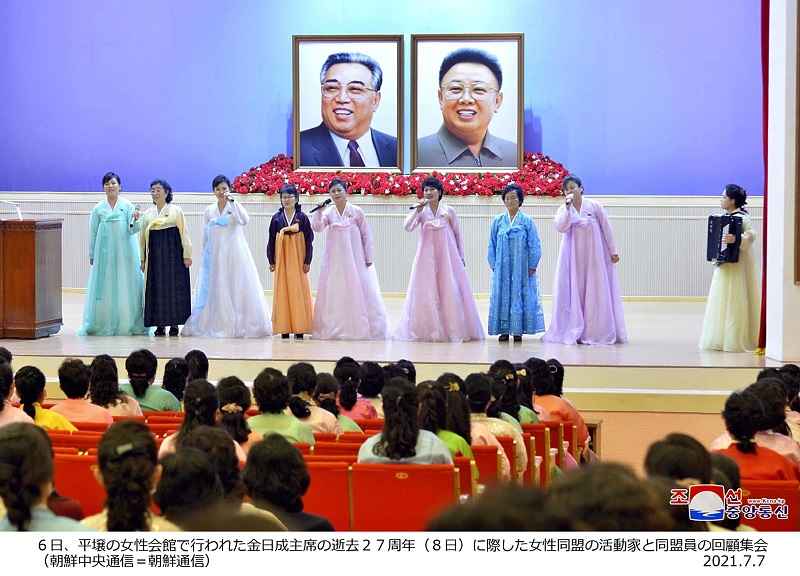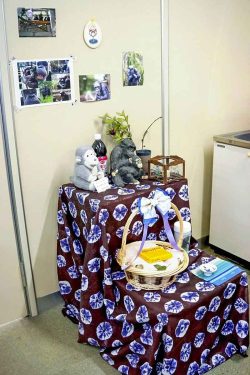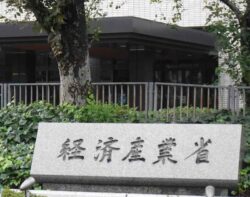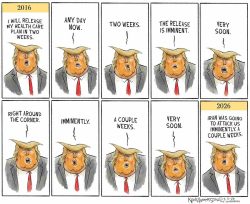
Women in traditional clothing are seen at an event held by a women’s organization in Pyongyang on July 6.
10:11 JST, July 21, 2021
SEOUL — North Korean authorities are cracking down increasingly hard on young people who like fashion and expressions that are popular in South Korea.
The regime of North Korean leader Kim Jong Un apparently fears that if young people, who are said to be less loyal to the country than other generations, are exposed to South Korea’s liberal culture, it could cause upheaval in the regime in the future.
According to a parliamentary report by the National Intelligence Service, South Korea’s intelligence agency, the North has banned expressions often used in South Korea, saying they are “unsocialist and the enemies of the revolution.”
Prohibited phrases include “oppa,” which means older brother but is also used by wives to refer to their husbands, and “namchin,” which is a shortened word for boyfriend. These phrases are frequently used by young people in the South.
“Disarray” in hairstyles is also subject to increased pressure. According to a man in his 30s who fled from North Korea and now lives in South Korea, many young men in the North like to have a “two block” cut with a short back and sides, while young women like having long hair. But such hairstyles are prohibited, as authorities say a two block haircut is not as short as a military haircut and that long hair on women emphasizes their femininity too much.
North Korea enacted in December legislation that stipulates, at worst, the death penalty for people who disseminate South Korean dramas and other items. The legislation also includes a clause that imposes up to two years of reeducation through labor for using phrases common in South Korea.
The report by the South Korean intelligence agency highlighted how Pyongyang had been working to strictly crack down following the enactment of the legislation.
Secretly watching South Korean dramas has been common in North Korea. According to an expert in South Korea who has North Korean sources, “Crash Landing on You,” a South Korean drama that was hugely popular in Japan, is well-liked in North Korea as well.
Since the end of last year, however, expressions and gestures common in South Korea have been banned, showing how South Korean culture has become more widespread. According to the expert, cell phone messages are checked without any notice and in some cases, authorities have caught people using abbreviated phrases and slang common in South Korea.
On June 20, Kim sent a letter to a convention held by a women’s organization in Pyongyang, saying that the group “must be alert to strange trends in clothing and language, and thoroughly nip them in the bud.”
Yoo Ho-yeol, an expert on North Korean politics and a professor emeritus at Korea University, said such moves by North Korean authorities are aimed at detecting and eliminating signs of rebellion among young people that could shake the regime. With the Sino-North Korean border sealed to prevent the spread of the novel coronavirus, it has been difficult for outside information to flow into the country.
“[North Korean authorities] seem to be trying to use this opportunity to eliminate the boom in South Korean culture,” Yoo said.
Top Articles in World
-

Israeli Ambassador to Japan Speaks about Japan’s Role in the Reconstruction of Gaza
-

Videos Plagiarized, Reposted with False Subtitles Claiming ‘Ryukyu Belongs to China’; Anti-China False Information Also Posted in Japan
-

Nepal Bus Crash Kills 19 People, Injures 25 Including One Japanese National
-

Ukrainian Ambassador Closely Watching Japan’s Revision of Defense Export Rules, Hopes for Future Arms Support
-

China, India Tapping into Promising African Market; Beijing Announces Tariff Cuts, Both Countries Aim to Expand Exports
JN ACCESS RANKING
-

Producer Behind Pop Group XG Arrested for Cocaine Possession
-

Japan PM Takaichi’s Cabinet Resigns en Masse
-

Man Infected with Measles Reportedly Dined at Restaurant in Tokyo Station
-

Israeli Ambassador to Japan Speaks about Japan’s Role in the Reconstruction of Gaza
-

Videos Plagiarized, Reposted with False Subtitles Claiming ‘Ryukyu Belongs to China’; Anti-China False Information Also Posted in Japan

























